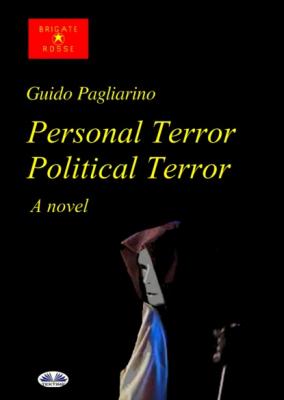ТОП просматриваемых книг сайта:















Personal Terror Political Terror. Guido Pagliarino
Читать онлайн.Название Personal Terror Political Terror
Год выпуска 0
isbn 9788835426301
Автор произведения Guido Pagliarino
Издательство Tektime S.r.l.s.
Guido Pagliarino
Personal Terror Political terror
A novel
Translation by Barbara Maher
Guido Pagliarino
P ersonal Terror Political Terror
A novel
Translation from Italian to English by Barbara Maher
Tektime Dist r ibution
Copyright © 2021 Guido Pagliarino – All rights belong to the author
Original work in Italian:
Il Terrore Privato Il Terrore Politico – Romanzo - Written between 2006 and 2009
1st Edition, in hard copy and in various electronic formats, Copyright © 2012-2013 GDS Editions
2nd Edition, in hard copy printed by Create Space, and in e-books of various formats edited by the author, Copyright © 2016 Guido Pagliarino
3rd Edition, in hard copy and in e-books of various formats, Tektime Distribution, Copyright © 2017 Guido Pagliarino
The cover of this book was designed electronically by Guido Pagliarino, Copyright © of the Author
Apart from persons appearing in news stories and history, the characters, events, people’s names and surnames, the names of organizations and businesses and their locations, which appear in the novel, are imaginary. Any references to real or judicial persons and, in general, to past and present reality are involuntary.
Index
Guido Pagliarino Personal Terror Political Terror Novel
Chapter 11
Chapter 12
Chapter 13
Chapter 14
Chapter 15
Chapter 16
Chapter 17
Chapter 18
Chapter 19
Chapter 20
Chapter 21
Chapter 22
Chapter 23
Chapter 24
Chapter 25
Chapter 26
Chapter 27
Chapter 28
Personal Terror Political Terror
The Ear Monster, as the media would quickly have nicknamed him somewhat grotesquely, had committed the first murder on a morning in late September 2000. The victim was a wealthy woman, Maria Capuò Tron, a 52-year-old housewife married to a hospital doctor, killed in their hilltop villa in Turin, in Mongreno Street, while her husband Amilcare was on duty and the family’s domestic help had gone out to do some errands. The couple had no children. The housekeeper, a legal Filipino immigrant, had found the body lying on the floor of the bedroom when she returned. As the autopsy would later ascertain, the victim had not been raped or tortured in any way, but killed quickly, albeit atrociously, by a sharp blow into the ear with an ice pick, which perforated her cerebrum. There was no sign of disarray in the house.
The widower had called the police after the housekeeper had telephoned him at the hospital. He had rushed home and dialed 113.
According to the initial investigations, the murderer could have entered the house through one of the windows on the ground floor, left open on that late-September day still enjoying a taste of summer, after climbing over the wall surrounding the cottage.
The killer, and this would be the only time, had taken some jewelry from a box inside a chest of drawers in the room where the crime had taken place. According to the insurance company, it had an estimated worth of three hundred million lire, or over one hundred and fifty thousand euros today.
In view of the theft, the maid had been the prime suspect, at the very least as a possible insider. With the authorization of Dr Marcello Trentinotti, Deputy Public Prosecutor assigned to coordinate the investigation, the woman had been detained the next morning, taken to Police Headquarters and questioned by Deputy Commissioner Evaristo Sordi. He had been charged with the investigation into the crime by the head of the Homicide Department of the Squadra Mobile, Deputy Commissioner Giandomenico Pumpo. As he would later report to the magistrate, Sordi had released the woman towards evening because of a total lack of evidence.
A few days later, a new crime had completely exonerated her, and the different lead of a serial killer was being explored.
Although he had retired in 1984, my dear and only friend Vittorio D'Aiazzo, Emeritus Police Commissioner, had wanted to work on the case in collaboration with the Police as an informal consultant, as he had already done for some particularly interesting cases after his retirement.
Vittorio would turn eighty-two on April 30, 2001, but age had not made him lose his verve. For him, it was not only an intriguing pastime so he could still feel active, but he was "doing a good service to others" as he had once told me, "a service that I want to continue doing to help make this amoral society a little less unjust and, perhaps, make my neighbor a little less unhappy". It was one of his ways of obeying that precept of love which he had tried to implement, I imagine, his whole life and, certainly, since I had met him in the now distant 50s of the bloodthirsty and blood-filled twentieth century that was coming to an end without the promise of any improvement for the next millennium.

